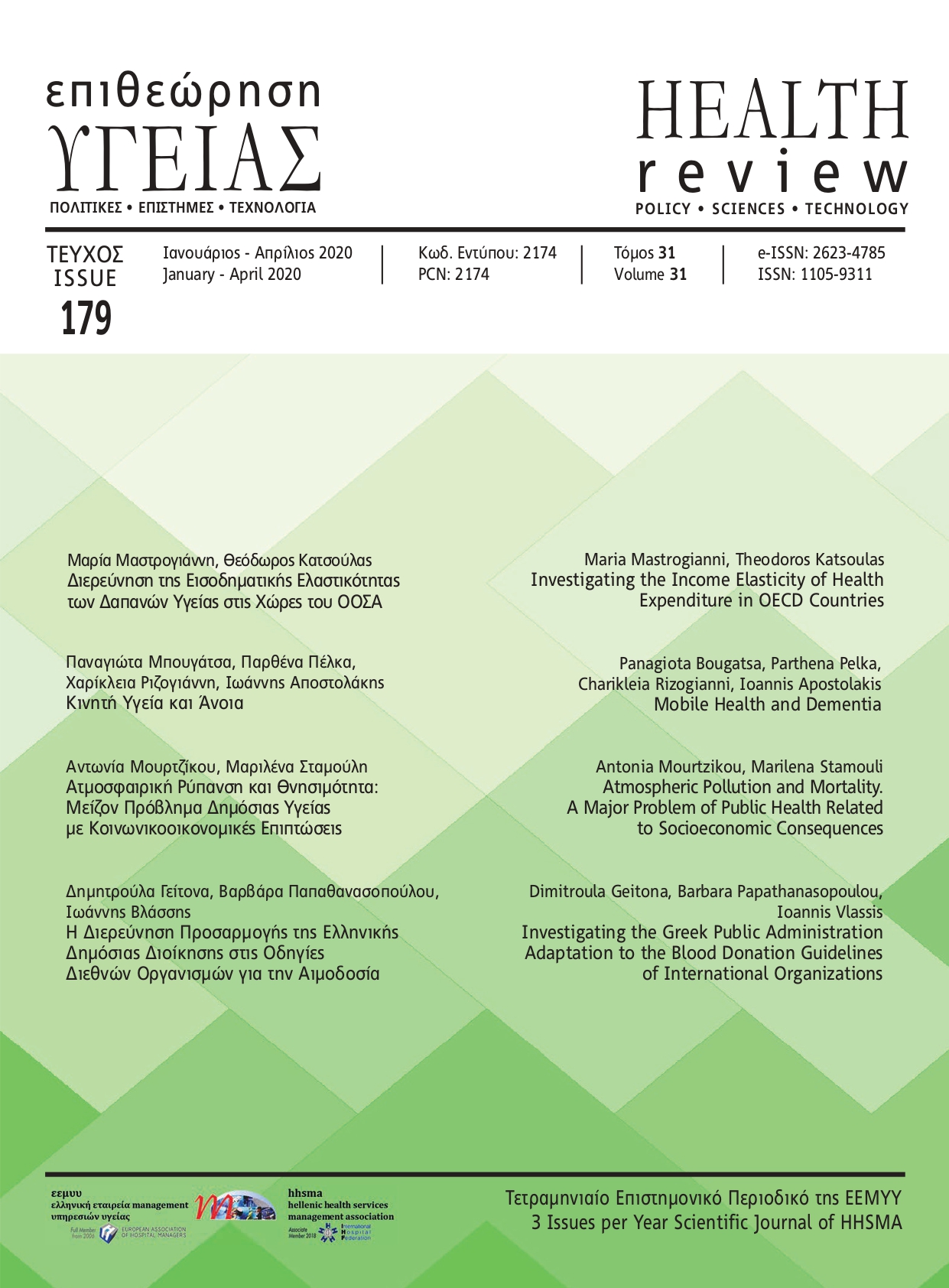
3 Issues per Year Scientific Journal of HHSMA
Editor in Chief: Georgia Oikonomopoulou MSc, PhD(c), Board Member of HHSMA, Board Member of EAHM
Latest Published Articles
Introduction: The long-term increase in both health expenditure as a whole and its individual components (hospital, pharmaceutical expense) at rates higher than Gross Domestic Product (GDP) has garnered the interest of the scientific community. At the same time, policies for restraining health expenditure have been adopted internationally. An important tool for establishing health policies is the knowledge and the determination of the income elasticity of health expenditure. Aim: To investigate the income elasticity of health expenditure for OECD countries. Specifically, to review the price of income elasticity of health expenditure calculated in international studies conducted over the last decades for OECD countries. Method: A systematic review of papers published up until July 2018 was conducted. Search was performed on PubMed, Medline, Scopus, Science Direct and OECD. The criteria for inclusion in this review, which follows Prisma Checklist guidelines, were the study and calculation of the income elasticity of health expenditure in OECD countries using time-series, cross-sectional data or a combination of them. Results: Only 21 of the scientific papers retrieved met the criteria for inclusion in this review. Twelve of them, using panel data and calculating the income elasticity less than one, ranked the health good in normal goods, while the others, using either time-series or cross-sectional data, ranked it in the luxury goods. Conclusions: Earlier studies before 2000, using either cross-sectional or time-series data, led to the conclusion that health is a luxury asset, while recent studies, using panel data, which is the most reliable method, concluded that health is classified as a normal good.
Introduction: Dementia is a chronic disease which has no cure and progressively affects the behavior and the daily function of the patients. New technologies and applications can play a major role in dementia modifying intervention. Aim: To review current evidence on new technologies applications for Dementia modifying intervention, and the relevant legislation. Material and methods: Studies of the last five years were reviewed in the databases Scopus, ProQuest, PubMed. The legislation at the official journal of the Greek Government and at the official journal of the European Union was also reviewed. We used the search terms, both in Greek and English Language, to establish clear subject relevance: «mobile health», «m-health», «ehealth», «dementia», «chronic diseases», «Alzheimer», «Quality», «Apps/Applications», «artificial intelligence», «internet of things», «consumer», «liability». Results: Health organizations and researchers have developed a wide range of modifying dementia intervention applications for patients in every day care. Through the evolution of technology more integrated applications are to be developed. Conclusions: In the future, mobile health will play a significant role in modifying interventions in chronic diseases. Health Organizations must be actively involved in their development. Legislative regulations are necessary to assure the quality of mobile health and create motives to enforce supply and demand for mobile health services.
Exposure to air pollution is one of the most serious environmental public health problems, taking into account its extent and its inadvertent nature. Air pollution is characterized by the scientific community as "the global silent killer". According to the World Health Organization (WHO), 92% of the world's population breathes infected air; resulting in three million people every year losing their lives from air pollution-related diseases, 24% of morbidity and 23% of all deaths are attributable to environmental factors. Due to air pollution, the effects on health are classified as short-term (occurring directly on the same day or on days immediately following exposure) and long-term (related to long-term exposure to air pollution e.g. for life one person or for many years). In recent years, air pollution, mainly due to the economic crisis, skyrocketed, with dramatic effects on human health and, by extension, on the seriously suffering patient, the environment!
In this paper, the institutional framework of the Greek Public Administration for blood donation, the guidelines recommended by the European Union (EU) and the guidelines proposed by the World Health Organization (WHO) were studied. The voluntary donation and quality and safety standards for both the donor and the recipient were the main aspects investigated. The review methodology was used for investigating the institutional framework of Blood Donation and the primary sources analysis was conducted with the use of the content analysis method. The data collected were initially grouped and analyzed and then, a comparative analysis of the similar groups of the Greek institutional framework, the WHO, and the EU was conducted. The main aim of this study was to investigate if the Greek institutional framework for Blood Donation fully or partially complies with WHO and EU guidelines. The comparative analysis of the data revealed that the institutional framework in Greece is adapted to the latest policies of WHO, and has integrated EU policies. Areas that do not comply with the WHO guidelines relate to 100% voluntary blood donation and implementation of a web-based information system. The long-term effort of the Greek National Health Service (NHS) to adapt to international standards in order to improve the quality of life of transfused patients emerged from this research. Notwithstanding, the actions of the state should aim at increasing the voluntary blood donation and establishing a single information system for the efficient management of a precious good, as is blood.
